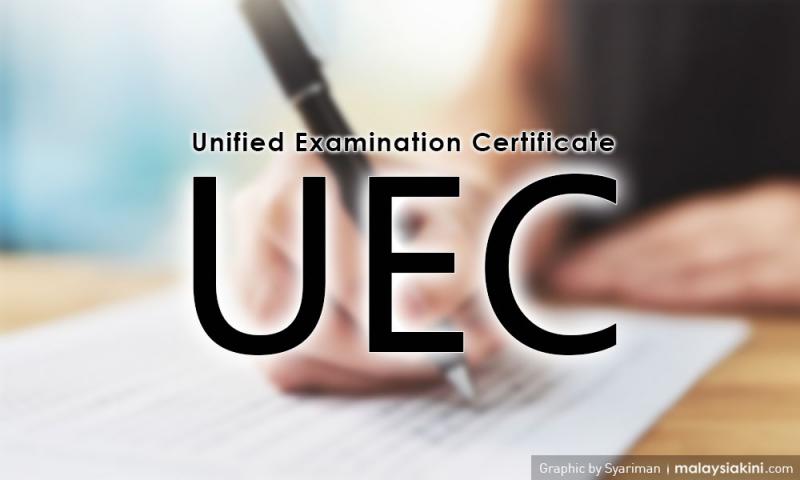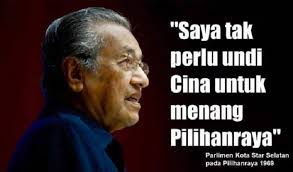
Kua Kia Soong
LETTER | Dong Zong president has urged former education minister Maszlee Malik and his then deputy Teo Nie Ching, along with the UEC task force, to explain to the public why they have failed to submit the report on the recognition of the Unified Examination Certificate (UEC) to the ministry within the agreed deadline.
The three-person task force was set up in October 2019 by the Pakatan Harapan government to study the viability of recognising the UEC. It appears the task force has completed the report but has been unable to submit it to the Education Ministry despite repeated attempts.
The Dong Zong president said he hoped the new BN-Perikatan Nasional government would be able to uphold the spirit of the “Malaysian Family” and give the UEC fair consideration for recognition.
There seems to be no end to the UEC recognition farce. In 2019, after the education minister had already set up the task force, then-premier Dr Mahathir Mohamad went on to say that “the recognition of UEC needs to consider the feelings of Malays."
Isn’t it amazing that the Cambridge O levels and A levels have been held in our country since independence but we don’t hear anyone voicing consternation about how these foreign English-language examinations can hurt the feelings of the Malays or compromise the unity and harmony among Malaysians or in any way threaten the status of the national language!
It was clear from the start that Mahathir and his pribumi party had no intention of recognising the UEC since his party exists to champion the “bumiputera agenda”. As Mahathir has admitted, these election promises were made because Harapan never thought they would win anyway.
LETTER | Dong Zong president has urged former education minister Maszlee Malik and his then deputy Teo Nie Ching, along with the UEC task force, to explain to the public why they have failed to submit the report on the recognition of the Unified Examination Certificate (UEC) to the ministry within the agreed deadline.
The three-person task force was set up in October 2019 by the Pakatan Harapan government to study the viability of recognising the UEC. It appears the task force has completed the report but has been unable to submit it to the Education Ministry despite repeated attempts.
The Dong Zong president said he hoped the new BN-Perikatan Nasional government would be able to uphold the spirit of the “Malaysian Family” and give the UEC fair consideration for recognition.
There seems to be no end to the UEC recognition farce. In 2019, after the education minister had already set up the task force, then-premier Dr Mahathir Mohamad went on to say that “the recognition of UEC needs to consider the feelings of Malays."
Isn’t it amazing that the Cambridge O levels and A levels have been held in our country since independence but we don’t hear anyone voicing consternation about how these foreign English-language examinations can hurt the feelings of the Malays or compromise the unity and harmony among Malaysians or in any way threaten the status of the national language!
It was clear from the start that Mahathir and his pribumi party had no intention of recognising the UEC since his party exists to champion the “bumiputera agenda”. As Mahathir has admitted, these election promises were made because Harapan never thought they would win anyway.
So why put the country through the farce of setting up a “special task force” and wasting everybody’s time and money? What happens if there is no consensus among the task force members on the report - whose recommendation among the three members will carry more weight?
And what if the cabinet refuses to heed the task force’s recommendations just as many other reports have been ignored after being submitted by previous Royal Commissions on an array of matters.
Reveal MQA’s assessment of the UEC
In truth, the only missing piece in this whole UEC recognition farce is the professional assessment of the UEC by the Malaysian Quality Assurance (MQA) that is tasked with doing this job of academic accreditation of certificates.
Thus, if the MQA were a professional accreditation institution without political constrictions, it would spell out in no uncertain terms what its audit of the UEC has concluded.
Has the government consulted the MQA on this? It does not matter if the requirements of the MQA are far more stringent than those of the National University of Singapore – it just must spell out in no uncertain terms what the results of that audit are.
The government cannot simply suspend a purely professional decision for more than forty years.
It should be pointed out at the outset that, in sharp contrast to the capabilities of foreign students, BM and English are compulsory language papers in the UEC and many MICSS schools also run the SPM at the fifth secondary year (the MICSS is a six-year secondary school system).
This easily demolishes the myth that MICSS students only study in the Chinese medium. To be fair to our civil service and local tertiary institutions, if they require an SPM credit in BM for UEC holders, that would be considered reasonable.
Nevertheless, the academic accreditation of the UEC by MQA is a totally separate matter altogether.
Malaysians should also know that there are hundreds of non-Chinese students in the MICSS and almost 100,000 non-Chinese students in Chinese-medium primary schools of Malaysia.
This is in sharp contrast to UiTM, a huge public institution funded by all taxpayers, yet which denies entry to all “non-bumiputera”.
It is also worth noting that there are more than 100,000 “bumiputera only” students attending UiTM while in the 63 MICSS there are only 85,000 students including Chinese, Malay, Indian and indigenous peoples. So please drop the red herring about MICSS being “segregationist”.
The UEC has been held every year since it started in 1975. Today, hundreds of respected foreign tertiary institutions around the world recognise the UEC and our MICSS students are welcomed in countries all over the globe, including France, Germany, and Russia.
Ever since the 80s, the National University of Singapore has been poaching hundreds of top UEC students not only for their academic excellence but also for their trilingual capabilities, to balance the cultural mix of their anglophile Singaporeans.
Recognising the UEC will allow MICSS graduates to be admitted into our public tertiary institutions as well as the civil and armed services, which is the recently stated intention of the government.
This will help to promote greater integration among Malaysians and alleviate the financial plight of those MICSS graduates who cannot afford tertiary education in private colleges here or abroad.
In other words, by not recognising the UEC, the government is depriving a sector of the Malaysian population of their human right to education and access to state institutions that have been paid for by all Malaysian taxpayers.
Would it be congruent for the government to sit in the UN Human Rights Council when it does not recognise the mother tongue education system of its own people?
KUA KIA SOONG is Suaram adviser
And what if the cabinet refuses to heed the task force’s recommendations just as many other reports have been ignored after being submitted by previous Royal Commissions on an array of matters.
Reveal MQA’s assessment of the UEC
In truth, the only missing piece in this whole UEC recognition farce is the professional assessment of the UEC by the Malaysian Quality Assurance (MQA) that is tasked with doing this job of academic accreditation of certificates.
Thus, if the MQA were a professional accreditation institution without political constrictions, it would spell out in no uncertain terms what its audit of the UEC has concluded.
Has the government consulted the MQA on this? It does not matter if the requirements of the MQA are far more stringent than those of the National University of Singapore – it just must spell out in no uncertain terms what the results of that audit are.
The government cannot simply suspend a purely professional decision for more than forty years.
It should be pointed out at the outset that, in sharp contrast to the capabilities of foreign students, BM and English are compulsory language papers in the UEC and many MICSS schools also run the SPM at the fifth secondary year (the MICSS is a six-year secondary school system).
This easily demolishes the myth that MICSS students only study in the Chinese medium. To be fair to our civil service and local tertiary institutions, if they require an SPM credit in BM for UEC holders, that would be considered reasonable.
Nevertheless, the academic accreditation of the UEC by MQA is a totally separate matter altogether.
Malaysians should also know that there are hundreds of non-Chinese students in the MICSS and almost 100,000 non-Chinese students in Chinese-medium primary schools of Malaysia.
This is in sharp contrast to UiTM, a huge public institution funded by all taxpayers, yet which denies entry to all “non-bumiputera”.
It is also worth noting that there are more than 100,000 “bumiputera only” students attending UiTM while in the 63 MICSS there are only 85,000 students including Chinese, Malay, Indian and indigenous peoples. So please drop the red herring about MICSS being “segregationist”.
The UEC has been held every year since it started in 1975. Today, hundreds of respected foreign tertiary institutions around the world recognise the UEC and our MICSS students are welcomed in countries all over the globe, including France, Germany, and Russia.
Ever since the 80s, the National University of Singapore has been poaching hundreds of top UEC students not only for their academic excellence but also for their trilingual capabilities, to balance the cultural mix of their anglophile Singaporeans.
Recognising the UEC will allow MICSS graduates to be admitted into our public tertiary institutions as well as the civil and armed services, which is the recently stated intention of the government.
This will help to promote greater integration among Malaysians and alleviate the financial plight of those MICSS graduates who cannot afford tertiary education in private colleges here or abroad.
In other words, by not recognising the UEC, the government is depriving a sector of the Malaysian population of their human right to education and access to state institutions that have been paid for by all Malaysian taxpayers.
Would it be congruent for the government to sit in the UN Human Rights Council when it does not recognise the mother tongue education system of its own people?
KUA KIA SOONG is Suaram adviser







Whatever was in the draft UEC report, the Harapan Government fell in February 2020 , so, making a polemic out of this is amounting to Flogging a Dead Horse.
ReplyDelete"The government cannot simply suspend a purely professional decision for more than forty years."
ReplyDeleteReally?? Mr Kua must be dreaming if he thinks the government of the day cannot ignore the issue for the next 40,000 years. Simply because it is a non Malay initiative.
"In other words, by not recognising the UEC, the government is depriving a sector of the Malaysian population of their human right to education and access to state institutions that have been paid for by all Malaysian taxpayers."
Human right??? Does Mr Kua thinks the Kerajaan Allah give a F about human right so long as it does not apply to Malays?
That is why I concluded the UN Human Right Council that co-opted Malaysia lost its credibility by doing so. And the Kerajaan Allah thinks their shit will smell like roses with this entry into this useless UN organisation - what a joke!